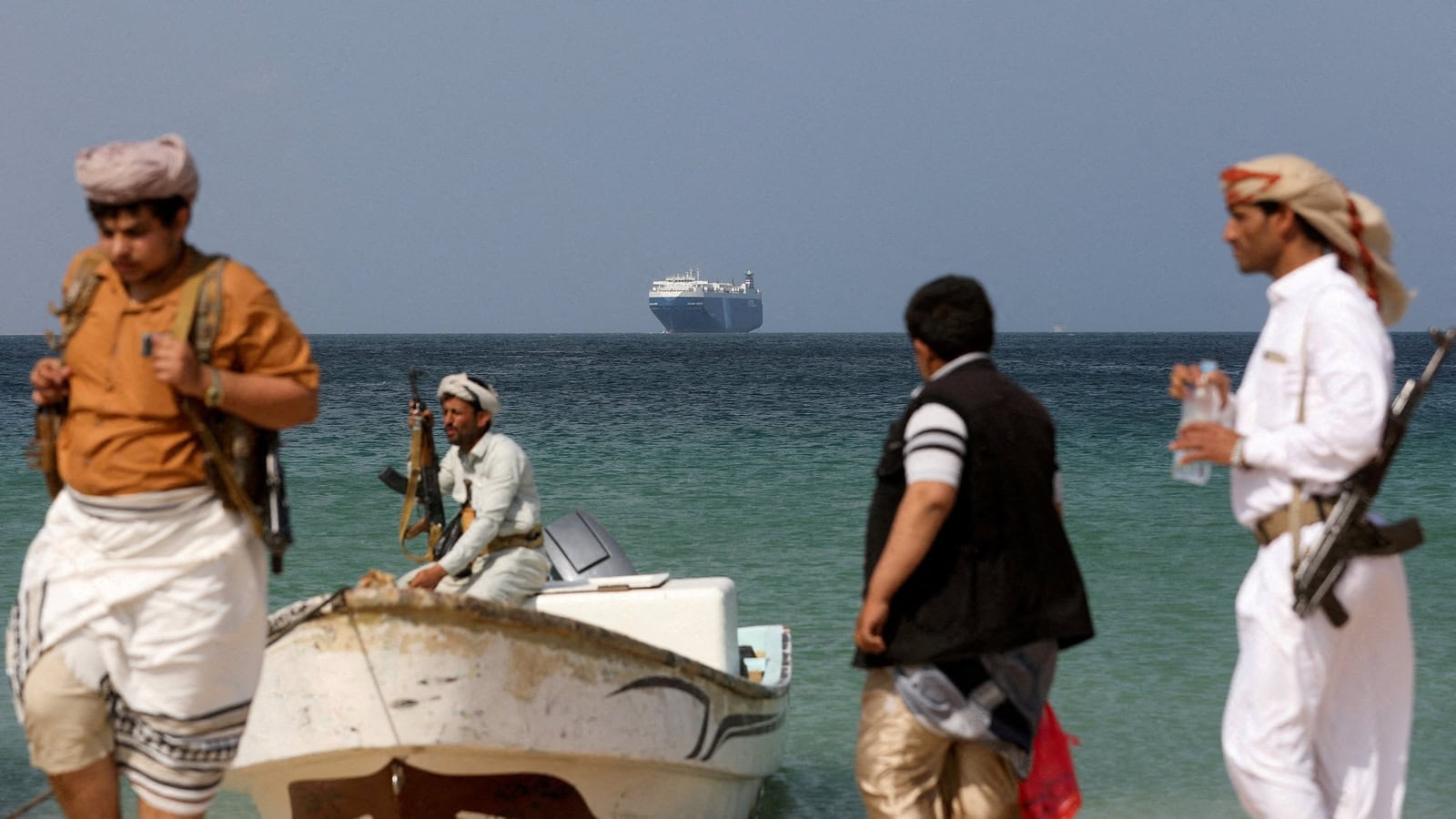
يقف مسلحون على الشاطئ بينما ترسو سفينة الشحن التجارية "غالاكسي ليدر"، التي استولى عليها الحوثيون في اليمن الشهر الماضي، قبالة سواحل الصليف في اليمن بتاريخ 5 ديسمبر 2023. (رويترز)
22-06-2025 at 7 PM Aden Time
|
|
Aden (South24 Center)
On Saturday evening (June 21), Yemen’s Houthi group threatened to attack American vessels in the Red Sea and Gulf of Aden, should Washington intervene militarily alongside Israel against Iran amid the rapidly escalating regional tensions.
The warning came in a statement by the group’s military spokesperson, Yahya Saree, who declared: “Any direct American intervention in the war against the Islamic Republic of Iran will place all US interests in the Red Sea, the Gulf of Aden, and beyond within striking range of our weapons.”
He added that the group is closely monitoring developments and “will not stand idly by in the face of any aggression targeting the Axis of Resistance”, a reference to the Tehran-backed regional alliance.
Hours after the statement, the US launched precision airstrikes at dawn on Sunday targeting three key Iranian nuclear facilities, in Natanz, Isfahan, and Fordow. The strikes employed B-2 stealth bombers, long-range Tomahawk missiles and bunker-busting GBU-57 bombs.
In a press conference Sunday morning, US President Donald Trump, flanked by Vice President J.D. Vance, Defense Secretary Pete Hegseth and Secretary of State Marco Rubio, announced that the strikes “achieved their objectives with remarkable accuracy”, confirming that the Fordow facility had been “completely destroyed”. Trump warned that future strikes would be “far larger and easier” if Iran fails to change its behavior in the Middle East.
The Iranian government condemned the strikes as “a blatant violation of international law and a direct assault on national sovereignty”, according to a foreign ministry statement. Minister Abbas Araghchi asserted Tehran’s full right to military retaliation, vowing that “the American aggression will not go unanswered, we will choose the time and place of our response”.
The Islamic Revolutionary Guard Corps (IRGC) denounced the attack as “a heinous crime” violating the UN Charter and international law, promising “a painful retaliation”. Shortly after the US strikes, Iran launched a missile attack against Israel.
US reports indicate significant damage to Iran’s nuclear enrichment infrastructure, particularly at Fordow, which was built over 80 meters below the ground. The GBU-57 bombs used are designed to penetrate multiple concrete fortifications and precisely destroy subterranean targets. Despite this, the International Atomic Energy Agency (IAEA) detected no radiation leaks post-the attack but expressed grave concern, and called for an emergency meeting in Vienna on Monday.
In a Sunday statement, the Houthis’ political bureau condemned what it called “the brutal American aggression targeting the Islamic Republic of Iran and its nuclear facilities”. The group labeled the attack “a flagrant violation of international laws and conventions, a dangerous escalation, and a direct threat to regional and global security”.
The Houthis latest threat revives the Red Sea escalations of 2023–2024, when the group carried out dozens of drone and missile attacks on commercial and military vessels linked to the US, UK, and Israel. Washington had responded with airstrikes on Houthi strongholds in Sanaa, Saada, and Hodeidah under ‘Operation Prosperity Guardian’ launched in January 2024.
The most intense escalation began in mid-March 2025 when President Trump authorized a large-scale bombing campaign (Operation Rough Rider) targeting Houthi sites, including Hodeidah’s ports. By early May, a truce was announced, halting US strikes in exchange for a cessation of Houthi attacks on Red Sea shipping.
US Treasury Imposes Sanctions on Houthis
On Friday, June 20, the US Treasury Department imposed its largest sanctions package to date against the Houthis, targeting what it described as “the most extensive action yet against the Iran-backed Houthi financing networks”. The sanctions designate four key individuals, 12 economic entities, and two oil tankers involved in large-scale smuggling operations.
The Treasury stated that these networks used Hodeidah, Salif, and Ras Isa ports to smuggle Iranian oil and derivatives, generating vast revenues to fund the Houthis’ military operations in Yemen and beyond. Among those sanctioned are:
• Mohammed Abdulsalam: The Houthis spokesperson, accused of managing the oil firm ‘Black Diamond’ and leading trade negotiations with external parties like Russia.
• Abdullah Ihsan Abdullah Dabesh: Owner of ‘Yemen Elaph’, alleged to supply oil derivatives to black markets via Houthi-controlled ports.
• Businessmen Ali Ahmed Daghshan Tal’ah and his brother Daghshan Ahmed Daghshan: Who operate front companies financing the group’s war effort.
• Zaid Al-Washli: Director of Hodeidah and Salif ports, cited for facilitating arms and drone-component smuggling.
Sanctioned entities include front companies based in Sanaa and Hodeidah, such as ‘Black Diamond’, ‘Star Plus Yemen’, ‘Tamco’, ‘Royal Plus’, ‘Al-Usaili’, ‘Gasoline Aman’, ‘Azzahra’, ‘Yemen Elaph’, and ‘Abbot Trading’, alongside tankers ‘Valente’, ‘Atlantis MZ’, and ‘Sarah’ for illicit fuel shipments.
The Treasury stated that these networks generated massive revenues through Iranian oil smuggling at Hodeidah, Salif, and Ras Isa ports, directly financing Houthi military operations.
- South24 Center